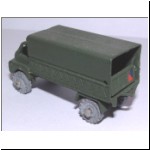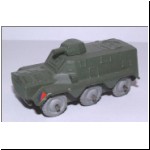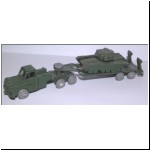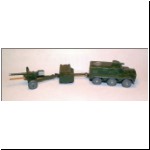Lesney's Matchbox
Series went from strength to strength during the second half of the
1950s, and inevitably caused many imitators to copy the idea of a
series of small scale models with a novelty box. The ''Sentry
Box'' series of military models was a small range which is typical of
such Matchbox-inspired toys.
The manufacturer of the Sentry Box series was Kemlows Diecasting
Products Ltd. For most of the 1950s Kemlows were based at Wood Green in
north London, but around 1958 they moved to a larger factory at Potters
Bar. The mainstay of Kemlows' production in the 1950s was the
Master Models series of 00 scale railway accessories which was
distributed by B.J.Ward Ltd. From time to time other toys were
produced, generally on a sub-contract basis, so that the Kemlows name
is rarely found on their models.
The only identification on the Sentry Box models is MADE IN ENGLAND,
which is usually achieved using a standard die stamp in the
mould. There are several designs of die stamp, and there are
minor variations on the models, including changes to this lettering, as
the dies were modified over their production life.
   The
Sentry Box boxes are the nicest feature of the series. A
sentry figure is shown on one side, and one of the end flaps forms a
peaked roof. On the other end the model name is printed in black
on a red panel, below which is a green panel with
white lettering saying ''IN THE SENTRY BOX SERIES MADE IN
ENGLAND". The Tank Transporter obviously had a longer box than
the standard size (thanks to
Nigel Clarke for the photo). The
Sentry Box boxes are the nicest feature of the series. A
sentry figure is shown on one side, and one of the end flaps forms a
peaked roof. On the other end the model name is printed in black
on a red panel, below which is a green panel with
white lettering saying ''IN THE SENTRY BOX SERIES MADE IN
ENGLAND". The Tank Transporter obviously had a longer box than
the standard size (thanks to
Nigel Clarke for the photo).
The models were painted matt dark green, sometimes over sprayed with a
brownish green to give a camouflage effect. Most models had
bisected square transfers at front and rear (dark blue/red or dark
blue/yellow). Silver trim was sometimes added to headlights
etc. Wheels were unpainted metal, except for the Centurion Tank,
for which the whole model was sprayed after assembly, including the
wheels.
 Unfortunately I
cannot be precise about when the series was issued,
because no contemporary advertisements or other information has come to
light. This may be because the series was sold by Woolworths, and
if this was an exclusive arrangement, no marketing to the trade would
have been necessary. According to Stephen Lowe of Kemlows, the
series came to a premature end because Woolworths decided to
discontinue war toys. My guess for a date for the series would be
late 1950s to early 1960s. Update
- four of the Sentry Box series were included in a 1958 price list by
Fred Bronner Corporation of New York (see photo) - the Bedford Lorry,
Armoured Car, Centurion Tank and Bedford Lorry with Gun. It
therefore seems likely that these were the first introductions in the
series, followed by the Tank Transporter and the Armoured Car set. Unfortunately I
cannot be precise about when the series was issued,
because no contemporary advertisements or other information has come to
light. This may be because the series was sold by Woolworths, and
if this was an exclusive arrangement, no marketing to the trade would
have been necessary. According to Stephen Lowe of Kemlows, the
series came to a premature end because Woolworths decided to
discontinue war toys. My guess for a date for the series would be
late 1950s to early 1960s. Update
- four of the Sentry Box series were included in a 1958 price list by
Fred Bronner Corporation of New York (see photo) - the Bedford Lorry,
Armoured Car, Centurion Tank and Bedford Lorry with Gun. It
therefore seems likely that these were the first introductions in the
series, followed by the Tank Transporter and the Armoured Car set.
   Stephen
Lowe also said that the dies for Kemlows' military models were
sold to Israel in the mid-1960s. We know for certain that some of
the River Series models (not by Kemlows) appeared in the Israeli Gamda
range. According to the Catalogue of Model Cars of the World by
Greilsamer & Azema, the Gamda range also included a Centurion tank
and tank transporter in 1:86 scale. Probably these were from the Sentry
Box dies - can any reader confirm, if possible with a photograph?
Update - it is now confirmed
that the Gamda tank transporter was a reissue of the Sentry Box
item. Photos thanks to Vic Davey and Hadi Orr. Stephen
Lowe also said that the dies for Kemlows' military models were
sold to Israel in the mid-1960s. We know for certain that some of
the River Series models (not by Kemlows) appeared in the Israeli Gamda
range. According to the Catalogue of Model Cars of the World by
Greilsamer & Azema, the Gamda range also included a Centurion tank
and tank transporter in 1:86 scale. Probably these were from the Sentry
Box dies - can any reader confirm, if possible with a photograph?
Update - it is now confirmed
that the Gamda tank transporter was a reissue of the Sentry Box
item. Photos thanks to Vic Davey and Hadi Orr.
All of the series are quite difficult to find in boxed condition,
although unboxed models are reasonably common. In my experience
the set of the Armoured Car, Limber and Gun is the rarest item.
Descriptions of the individual models follow.
 Bedford
RL 3 ton
Army Lorry Bedford
RL 3 ton
Army Lorry
Length 58mm.
A one-piece casting, including the tilt, with only the tailboard as a
separate component. The lorry was sold individually as well as in
conjunction with the field gun. The box end flap read "3
Ton Bedford Lorry'' for the single item.
 Bedford
RL 3 ton Army Lorry with
Field Gun Bedford
RL 3 ton Army Lorry with
Field Gun
Length 58mm (lorry), 60mm (gun).
The box end flap read ''3 Ton Bedford Lorry Towing 25 Pdr."
Otherwise the same standard box was used as the single item.
 Armoured
Car Armoured
Car
Length 57mm.
This was a six-wheel armoured car with a rotating gun turret.
There was no baseplate. The box end flap read ''ARMOURED VEHICLE".
 Centurion
Tank Centurion
Tank
Length 58mm.
Rotating turret. Separate baseplate securing four concealed
wheels. Representations of the tracks were cast in, rather than
go to the expense of providing rubber tracks.
  Thornycroft
Antar Tank
Transporter Thornycroft
Antar Tank
Transporter
Length 166mm.
As far as I know this was only sold separately from the tank. It
is only an approximate model of the Antar, and is easily distinguished
from the Matchbox model (which is much better). Rumours of the Matchbox
tank transporter with metal wheels are almost certainly due to the
Sentry Box version! The tractor unit and trailer were each single
castings, except for two separate let-down ramps at the rear. The
two parts were permanently joined by a vertical axle pin with a spare
wheel at the top.
  Armoured
Car with Limber and
Field Gun Armoured
Car with Limber and
Field Gun
Length 62mm (armoured car), 43mm (limber), 60mm (gun).
The armoured car was modified with the addition of a short baseplate at
the rear carrying a hook (hence the increased length). This
baseplate was actually the same component as used
for the Limber. The Field Gun was also modified from the version sold
with the Bedford lorry - a box was added to the rear of the gun,
and a towing eye was provided in place of the previous peg.
|